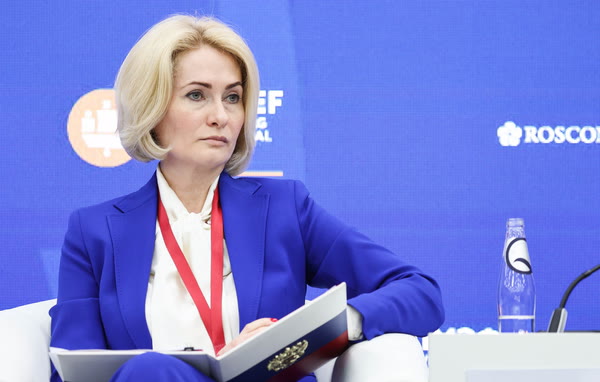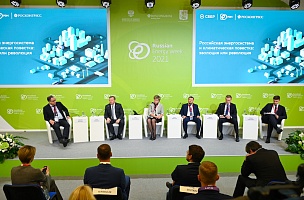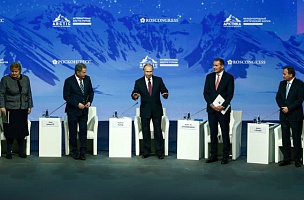Key conclusions
Food security is not a cause for concern in Russia
“In terms of the key indicators of the Food Security Doctrine – grain, meat, oil and fats, fish products – we have the needs of the domestic market more than covered. And all these areas are key for us in terms of exports. We can supply this food to world markets. Despite all the risk factors I have listed, we have increased exports of agricultural products by 16% in the first five months of this year,” Victoria Abramchenko, Deputy Prime Minister of the Russian Federation.
“A significant share of the increase [in the grain harvest – Ed.] over last season will go to the southern regions, which are geographically close to ports and, therefore, perfectly situated for exports. At the same time, domestic grain prices in Russia remain stable and the country is secure. In this particular case, food security has been confirmed,” Vitaliy Sergeychuk, Senior Vice President, VTB Bank.
“Russia is complying fully with all its commitments. And the figures that Victoria [Abramchenko – Ed.] quoted for last year and for the first months of this year confirm that we are managing to find this balance. On the one hand, we have maintained stability domestically while at the same time increasing exports, growing our economy, and making a significant contribution to solving the world’s problems,” Maksim Reshetnikov, Minister of Economic Development of the Russian Federation.
The pandemic, sanctions, and crisis mean setbacks in planned food security targets
“Unfortunately, global disasters like pandemics, like climate extremes, certainly like armed conflicts – they set us back. And now, unfortunately, political events, especially the military-political ones of recent times, have somewhat overshadowed the sustainable development agenda and the goals that humanity has set for 2030. And out of these goals, goal [number – Ed.] two, the elimination of hunger and ensuring food security, is of particular importance,” Oleg Kobyakov, Director, Liaison Office with the Russian Federation, Food and Agriculture Organization of the United Nations (FAO).
“As part of today’s discussion, we are talking about food security. And I would like to look at several risk factors that exist. They didn't start today, and they didn't start in 2022. They emerged from out of a pandemic. [...] And on top of that, countries have begun to stockpile food critically. China, for example, increased its purchases of corn six-fold during the pandemic. This destabilized the global food market. In addition to factors arising as a result of the pandemic in 2022, there were factors related to sanctions,” Victoria Abramchenko, Deputy Prime Minister of the Russian Federation.
“The consequences of the Russia–Ukraine crisis underline the importance of the relationship between security and the economy. And the humanitarian implications [of the crisis – Ed.] are of concern because we are now witnessing unprecedented hunger hanging like a cloud over a large part of the African population,” Jean-Baptiste Thiathie Tine, Ambassador Extraordinary and Plenipotentiary of the Republic of Senegal to the Russian Federation.
PROBLEMS
Rising gas prices
“Additional risk factors have been added due to the virtually complete naval and air blockade. This means that we run the risk of not getting food to places in the world where it’s badly needed. [...] The cost of gas has increased exponentially, and this means that in some countries it is simply impossible to produce fertilizer. Russian or Belarusian fertilizers still need to get to key grain-producing regions,” Victoria Abramchenko, Deputy Prime Minister of the Russian Federation.
“The second element is gas prices, and gas is a key component of fertilizer production everywhere. Gas prices inEurope. Some time ago, I still remember, Russian President Vladimir Putin spoke about this, and we proposed prices on the basis of our long-term contracts. It didn’t happen. [...] As a result, the price has gone up, enterprises in Europe became unprofitable, and many went out of business,” Aleksander Yakovenko, Russia's National Coordinator for the implementation of decisions of the UN Food Systems Summit; Rector, The Diplomatic Academy of the Ministry of Foreign Affairs of the Russian Federation.
Fertilizer shortages and high costs
“If we don’t start selling as much fertilizers as possible right now, this summer for next season, 2022–2023 will not only be cold, it will also be very hungry. Because there will be no harvest. Now we are talking about a special operation, a crisis that is happening now. But this is just one episode. If the necessary amount of mineral fertilizer is not applied to the ground all over the world, we will have a food crisis of global proportions,” Andrey Guryev, President, Russian Association of Fertilizer Producers (RAFP).
“We are experiencing certain difficulties in providing the necessary amount of fertilizer and so forth. But I think that by working together we can find a way out of the situation. I would like to say that in recent years Russia has become one of the most important suppliers of fertilizers to our market – 23%. That’s a serious figure. This is very important,” Rodrigo de Lima Baena Soares, Ambassador Extraordinary and Plenipotentiary of the Federative Republic of Brazil to the Russian Federation.
“The greatest challenges at the moment are related to food security and the availability of fertilizers at an affordable price. Prices on fertilizers continue to rise, and a number of other factors also threaten global security and food security. And there is a lot more to be done within the global fertilizer industry,” Mansukh Mandaviya, Minister of Health and Family Welfare and Minister of Chemicals and Fertilizers of the Republic of India.
SOLUTIONS
The creation of a food arbitrator, waving sanctions, should be considered
“The world needs a food arbiter. In 1954, FAO, the food and agricultural organization, was founded at the United Nations. That organization was created to fight global hunger. And I call upon my colleagues at the UN and my colleagues at FAO to create an international Red Cross for food that would address the problems and consequences arising from the illegal sanctions that have paralyzed logistics, the consequences of imposed restrictions on mutual settlements between countries. An organization that would ensure that all countries have equal access to the food market,” Victoria Abramchenko, Deputy Prime Minister of the Russian Federation.
“The creation of an arbitrator presents an interesting possibility. Nevertheless, FAO continues to use the authority and technical expertise entrusted to it by member countries. We monitor, put out a lot of statistical publications with the latest data, and adopt recommendations. Recommendations that might be of interest to our current audience about how to overcome the current food crisis. There is a recommendation directed at reconsidering and analyzing the policy of sanctions and, if possible, to waiving their application,” Oleg Kobyakov, Director, Liaison Office with the Russian Federation, Food and Agriculture Organization of the United Nations (FAO).
Read more in the Roscongress Foundation Information and Analytical System roscongress.org.






